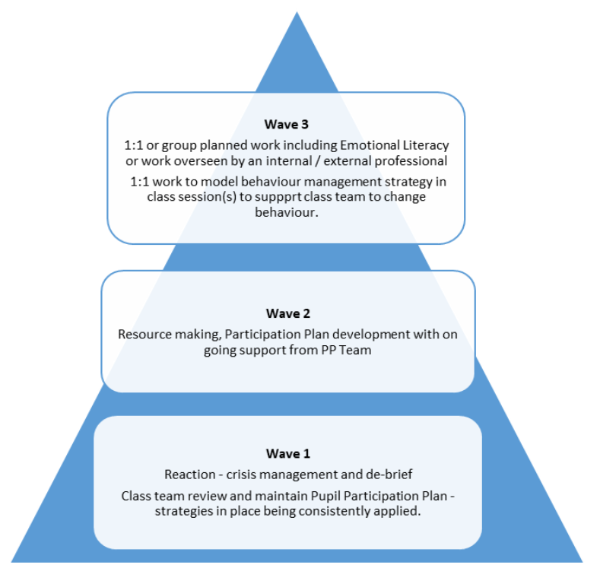Pupil Participation
Aims:
- Children will have an understanding of their emotions and be able to identify strategies, resources and activities that help them feel happy and emotionally safe;
- Children will be able to learn, apply and generalise strategies so that they are able to emotionally regulate themselves;
- Children will feel emotionally safe and resilient so that they are able to participate in their learning in the classroom with peers and class staff;
- We will work with other professionals and Parents / Carers to ensure that a wraparound approach to behaviour management and emotional regulation is applied;
- The voice of the children will be heard, they will contribute and participate in decisions about themselves and the school;
- Children will understand that their actions and behaviours impact on others;
- Children will understand the difference between right and wrong and the rule of law.
Organisation
The Personal Development, Welfare and Behaviour Lead, including Designated Safeguarding Lead (DSL) takes responsibility for the department. The DSL is supported by the Pupil Participation Lead (PPL) who is also the school’s Emotional Literacy Support Assistant and holds the School Mental Health Leader Certificate. There is also a Pupil Participation Assistant who supports with the delivery of support throughout the school.
Identification – How do we know who needs additional support?
Children that are struggling will need additional support from that which is provided as part of the normal classroom offer. In these circumstances the PP Team will work with stakeholders to help create a positive change, below are some of the ways we identify an additional need for intervention.
- Feedback from the Child;
- Parent /Carer feedback;
- Concerns identified by staff;
- Attendance concerns;
- IRIS/CPOMS/FAGUS – patterns of reporting;
- A referral through the school referral system.
Intent – what do our aims look like for children and families?
- To support children to understand Helpful Choices in school and the wider community;
- To develop positive attitudes and commitment to learning;
- To involve and work with Parents /Carers;
- To work with other services to provide wrap around care, strategies and resources;
- To support Children to understand their emotions and develop self-regulation strategies;
- To learn skills to develop and maintain friendships/relationships;
- For all children to feel safe and heard.
Intervention and support
Intervention to develop positive change takes place at three waves of support (see below). The DSL and PPL will involve other stakeholders to formulate a plan based on what is the best for the child. Intervention may be direct or indirect:

Implementation – How do we achieve our aims?
- We work with outside agencies to gain guidance and advice when required;
- Use tangible resources to support learning and understanding by using Small World, Puppets, Lego and Comic Strips;
- Develop personalised Toolkits to support emotional regulation;
- Develop understanding of Helpful Choices;
- Sessions delivered by the Emotional Literacy Support Assistant (ELSA);
- Provide a listening ear to children to help them with their worries;
- Engage parents to use resources and strategies.
Impact – How do we know we are achieving our aims?
- Children will be calm and safe to return to class and return to their learning;
- To recognise risk both online and offline including the use of mobile phones;
- Children will have increased resilience, confidence and knowledge to keep healthy and safe;
- Children will be responsible and respectful citizens of the school and wider community;
- Children will be able to recognise the difference between right and wrong;